- If there is to be any lasting hope for peace, prosperity and enlightenment in the Middle East,
- one must adopt a long view when all short-term provisions are failing.
To clean up a dirty war
Compared to, say, the Spanish Inquisition, the Holocaust or the Chinese Cultural Revolution, the Iraq War of 2003 may well be a minor blemish in the grander course of human history, yet it is one with its full share of baseness and duplicity. With all due respect to those who died or lost loved ones in the service of their country, only the most cynical or moronic of historians will ever identify any true "heroes" out of the host of antagonists that played out this sordid melodrama.
At one side is, or was, Saddam Hussein's Sunni-dominated Baath party, a regime whose brutal oppression of the country's northern Kurds and southern Shias was of medieval proportions.
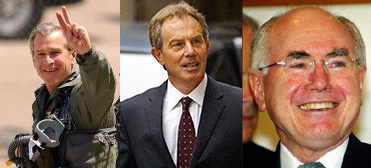 Consummate
Machiavellians: US President George W Bush, British Prime Minister Tony Blair
and Australian Prime Minister John Howard. No, Mr Bush, this is not a compliment
on your newfound appreciation for Italian fashion. (AP file photos)
Consummate
Machiavellians: US President George W Bush, British Prime Minister Tony Blair
and Australian Prime Minister John Howard. No, Mr Bush, this is not a compliment
on your newfound appreciation for Italian fashion. (AP file photos)
At another sat the elected and appointed officials of the United States, the United Kingdom and, to a somewhat lesser extent, Australia. Tempted by the world's second largest petroleum preserve (and the corporate interests that are the foundation of their political power), these leaders tricked their nations into launching a pre-emptive strike against a non-hostile country, with home-spun lies and half-truths regarding Saddam's propensity to use, and distribute, weapons of mass destruction.
Significant caches of WMDs were never found by returning UN weapon inspectors in 2002 and early 2003; presumably, the coalition forces that liberated Kuwait in 1991 had destroyed them all. Yet Baghdad, despite being punished by decade-long economic sanctions, went shopping for uranium in Africa, and was poised to launch a chemical attack within 45 minutes -- these were whoppers the American and British people were told to swallow. We all did.
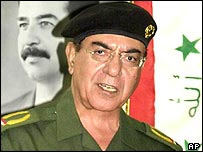 Former Iraqi Information Minister Mohammed Saeed al-Sahaf: His lies were
definitely more entertaining. (AP/BBC photo)
Former Iraqi Information Minister Mohammed Saeed al-Sahaf: His lies were
definitely more entertaining. (AP/BBC photo)
One way or another, the Baath regime -- as represented by Information Minister Mohammed Saeed al-Sahaf, who insisted that American forces never reached Baghdad, even as shots were heard outside his briefing room -- was doomed to be the scorn of ages. It was no less incredible that, as soon as statues of Saddam were being torn down, the occupiers lost no time in carving up the spoils of war, by granting lucrative reconstruction contracts to Anglo-American energy companies (notably Halliburton, which employed Dick Cheney as its CEO immediately before his becoming US Vice President). Never mind that many crazed Iraqis were looting everything they could get their hands on, down to the scant copper wires that barely held up the country's dilapidated power grid.
One rallying cry used by the administrations of George W Bush, Tony Blair and John Howard was the threat of an unholy alliance between Saddam Hussein and Osama bin Laden, whose base of operations in Afghanistan was but recently -- yet not completely -- uprooted by American forces and assorted Afghan militia. Sadly, our fear of Iraqi participation in global Islamist terrorism proved to be a self-fulfilling prophesy.
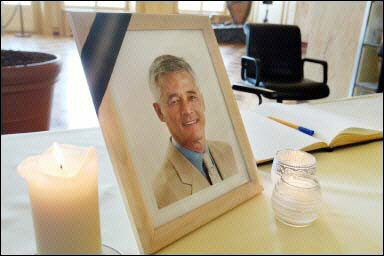 On
August 19, a truck bomb in Baghdad killed United Nations envoy Sergio Vieira de
Mello of Brazil, who led the UN aid efforts in East Timor and Iraq. The deaths
of Mello and twenty-two fellow UN workers, who dispensed humanitarian aid and
represented a world body whose majority members explicitly opposed the war in
Iraq, marked a particularly cruel turning point in the Iraqi resistance against
American and British occupation. (AFP photo by Thomas Coex)
On
August 19, a truck bomb in Baghdad killed United Nations envoy Sergio Vieira de
Mello of Brazil, who led the UN aid efforts in East Timor and Iraq. The deaths
of Mello and twenty-two fellow UN workers, who dispensed humanitarian aid and
represented a world body whose majority members explicitly opposed the war in
Iraq, marked a particularly cruel turning point in the Iraqi resistance against
American and British occupation. (AFP photo by Thomas Coex)
The Baath regime was essentially a secular, socialist dictatorship crudely fashioned after the reign of Josef Stalin, and it was ever leery of the fundamentalist sentiments amongst the Shia across the border between Iraq and Iran. Unlike the Talibans in Afghanistan, Saddam's cult of personality was so pervasive after nearly thirty iron-fisted years, he never had to bother with the likes of Al-Qaeda. (To score some sympathy amongst his Arab neighbors, however, he did rename his country "Islamic Republic of Iraq" upon the last desperate days of the first Gulf war, and later offered cash rewards to families of Palestinian suicide bombers.) Totalitarian tyranny, not ideological zeal, was Baghdad's modus operandi.
It was not until the Americans, the British and the Australians deposed Saddam that "holy warriors" from all over the Arab world, as well as the restive Kurdish and Shiite factionists within Iraq, saw their chance to fight along with the Iraqi resistance against the "Great Satan." Collectively, their tactics quickly evolved from sabotage and ambush to bombings of the Jordanian embassy, the UN headquarters in Baghdad, and the Imam Ali Mosque in Najaf, holiest of the Shia shrines.
In three months alone this summer, explosions echoed in Casablanca, Riyadh, Jakarta, Bombay and of course, Jerusalem.
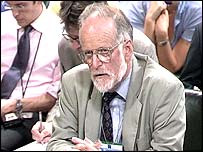 David
Kelly appeared before a public hearing in Parliament. (BBC photo)
David
Kelly appeared before a public hearing in Parliament. (BBC photo)
More American and British soldiers have died in Iraq after President Bush's dramatic declaration of the war's end aboard the flagship carrier USS Abraham Lincoln on May 1, than during the "major combat" leading to Saddam's ouster. Popular support for the war in Britain, which was never very high at the onset, was dealt a low blow by the suicide of UN weapons inspector David Kelly. Under dubious circumstances now being investigated by an official inquiry, the Oxfordshire scientist was exposed by the BBC as a source that questioned the efficacy of the military intelligence gathered by the government to bolster its cause for war.
Just as Bush initially blamed CIA director William Tenet for misleading intelligence, his administration is looking to pass the buck of securing postwar Iraq to other nations, and to the UN, whose majority never gave consent to war. Expectedly, the Americans still insist upon assuming command over any contingent force.
Some, like Australia and Poland, have already obliged, seeing it befitting their own interests to emulate their foreign policy after that of the US and the UK. Others -- notably France and Germany, mindful of their peacekeeping commitments in central Africa and Afghanistan, respectively, as well as their citizens' consistent disapproval of the war in Iraq -- would challenge American hegemony before agreeing to help in tidying up a mess that was not of their making.
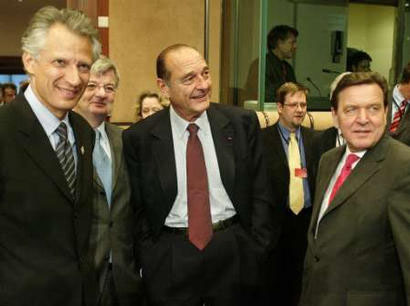 The
French and the Germans have opposed the war all along, but even they cannot
afford to gloat now. (Foreground from left: French Foreign Minister Dominique de
Villepin, German Foreign Minister Joschka Fischer, French President Jacques
Chirac, and German Chancellor Gerhard Shroeder. Reuters photo by Ives Herman)
The
French and the Germans have opposed the war all along, but even they cannot
afford to gloat now. (Foreground from left: French Foreign Minister Dominique de
Villepin, German Foreign Minister Joschka Fischer, French President Jacques
Chirac, and German Chancellor Gerhard Shroeder. Reuters photo by Ives Herman)
Though the French, the Germans and all others who had opposed the war certainly bore the least onus, they would be wise to save their "we-told-you-so's" for later. The Americans, the British, the Poles and most certainly the Iraqis do need all the help they can get. No matter who is to be in charge (i.e., whether Bush can be re-elected in 2004) until Iraq is rebuilt anew, this once-prosperous nation must be saved from its descent into anarchy, lest its vengeful riffraff threaten to (further) destabilize not just the region, but the entire world.
Iraq has never been, and can never be an isolated laboratory of geopolitical experimentation. To fit this piece of the puzzle, we may as well begin at the cornerstone of all troubles, the interminable conflict between the Israelis and the Palestinians.
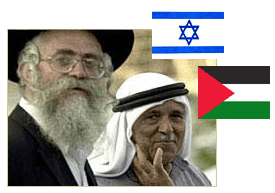 Peace
must begin (and end, as some say) in Jerusalem. (BBC photo)
Peace
must begin (and end, as some say) in Jerusalem. (BBC photo)
There must be progress along the "Road Map" towards Palestinian statehood. Israel must be persuaded, through economic incentives as well as sanctions, to relocate the settlers living in occupied Palestinian lands, and refrain from building new settlements, roads and walls there. The Palestinians, in turn, must recognize an accountable authority that has the will (a democratic mandate) and the means (a consolidated security force) to disband Hamas and the Islamic Jihad, neutralizing their armed wings and converting their schools, clinics and charities into legitimate institutions via Western and Israeli support.
Both sides must share Jerusalem as their spiritual and political capital. Millennia-old doctrines and prophesies notwithstanding, Temple Mount and the Noble Sanctuary must be as accessible as the Church of the Sepulcher, and preserved as they currently stand indefinitely.
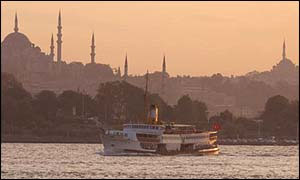 The
inclusion of Turkey within the European Union would forge a powerful bond of
goodwill between the West and the Muslim world. (BBC photo)
The
inclusion of Turkey within the European Union would forge a powerful bond of
goodwill between the West and the Muslim world. (BBC photo)
The West must then turn to the Muslim world not only for its oil, but its integral role in the global community. They can start by promoting tourism, cultural exchange and free trade across the Mediterranean, thus developing the north African coast as did the ancient Phoenicians. As despotic as the rulers of Algeria, Libya, Egypt, Syria, Saudi Arabia, Sudan, Iran and Pakistan may long remain, the West must continue to engage them in diplomacy and commerce, and not isolate them as the pariah states that Afghanistan and Iraq once were. The most generous -- and wishful -- gesture yet would be for the European Union to consider extending membership on probation to their nearest non-European neighbors, namely Turkey and Morocco.
Does it take all this just for the West to win enough goodwill from the Muslim world to be leveraged in Iraq? "No" is the pragmatic answer, to be sure, but if there is to be any lasting hope for peace, prosperity and enlightenment in the Middle East, one must adopt a long view when all short-term provisions are failing.
Once security and self-rule are restored in Iraq through even-handed international cooperation, under the full auspices of the United Nations, we can finally put this sorry business of war behind us, and mourn for the dead with a salvaged sense of rectitude.
CW, 6 September 2003
| Back to top |
